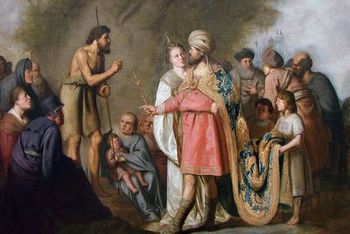
The third candle of the Advent wreath represents joy, yet there seems little that's joyful in John the Baptist's message. How we understand joy and relate it beyond self-interest to a just society that is compassionate and generous is key.
John the Baptist literally growls at those who have come to profess their repentance and get baptized, get right with God. He deals with an interesting cast of characters, the Jews, the tax collectors, and Roman soldiers. He dispenses a teaching instruction that bears no resemblance to the more familiar prescriptions of Temple priests and teachers of the Law. The offerings detailed by John are not from the menu of animal and vegetable sacrifces of the priests. Rather he points to their everyday actions, significantly to their sense of compassion and generosity.
In Ezekiel, an oracle describes God taking a sprig from atop a cedar tree. It is planted on the heights of Israel, a clear reference to Jerusalem and the Temple mount. Here it will "produce branches and bear fruit and become a splendid [or noble, worthy] tree." One problem is that cedars don't produce any fruit. Okay, maybe a skimpy little cone, but no fruit. Reading on, we find out more that reveals that this tree represents a vision of the Kingdom, of God's will fulfilled.
Joy comes when people are treated with compassion and generosity, not some, not many, but all of them, every kind as the Ezekiel oracle points out. To see how this works out, check out the sermon video in the panel below, and note the downloads available below the video panel.
John the Baptist literally growls at those who have come to profess their repentance and get baptized, get right with God. He deals with an interesting cast of characters, the Jews, the tax collectors, and Roman soldiers. He dispenses a teaching instruction that bears no resemblance to the more familiar prescriptions of Temple priests and teachers of the Law. The offerings detailed by John are not from the menu of animal and vegetable sacrifces of the priests. Rather he points to their everyday actions, significantly to their sense of compassion and generosity.
In Ezekiel, an oracle describes God taking a sprig from atop a cedar tree. It is planted on the heights of Israel, a clear reference to Jerusalem and the Temple mount. Here it will "produce branches and bear fruit and become a splendid [or noble, worthy] tree." One problem is that cedars don't produce any fruit. Okay, maybe a skimpy little cone, but no fruit. Reading on, we find out more that reveals that this tree represents a vision of the Kingdom, of God's will fulfilled.
Joy comes when people are treated with compassion and generosity, not some, not many, but all of them, every kind as the Ezekiel oracle points out. To see how this works out, check out the sermon video in the panel below, and note the downloads available below the video panel.
| 12-13-15-ff-answers.pdf |
| 12-13-15-bearing_fruit_thats_worthy.pdf |
